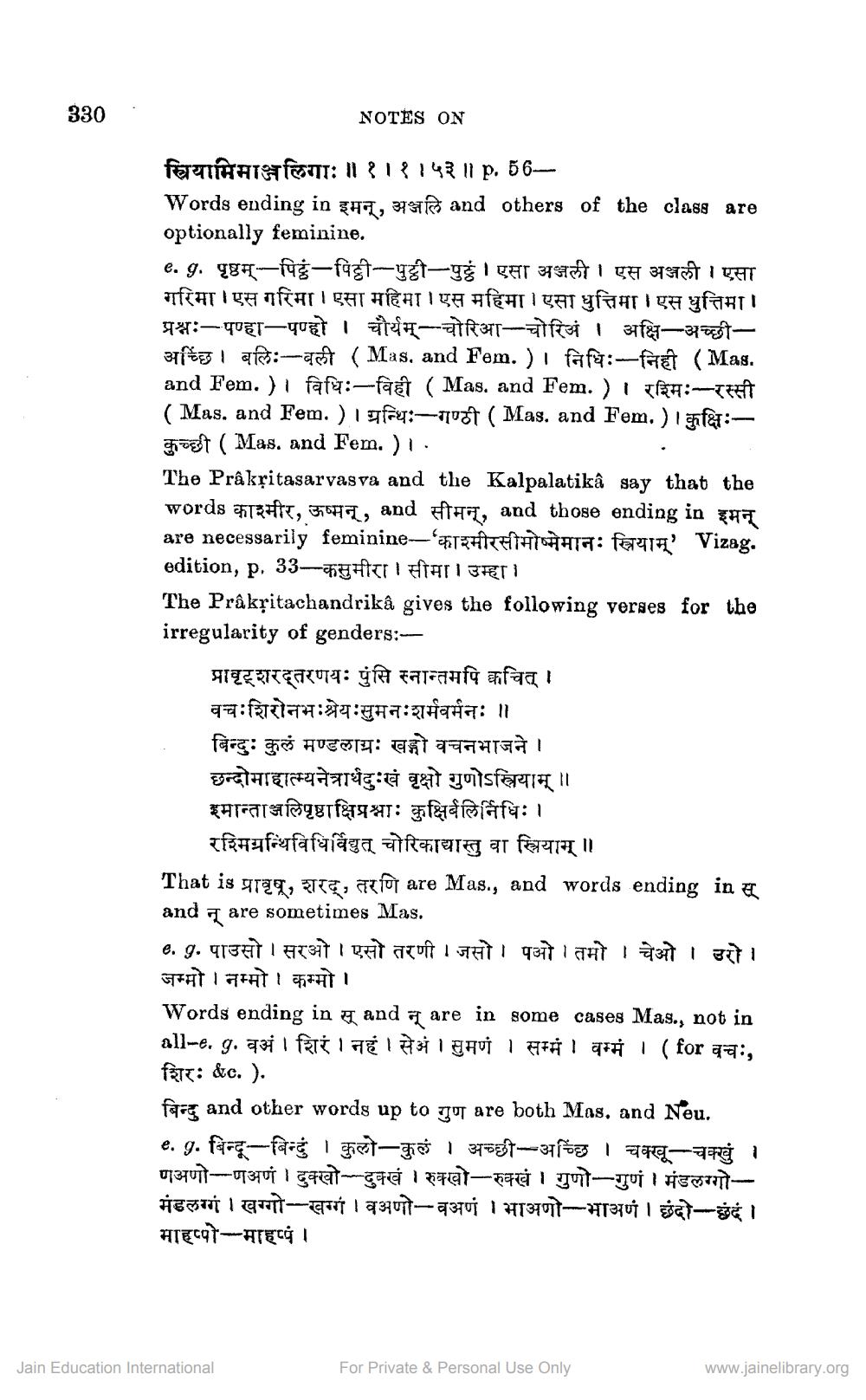________________
330
NOTES ON
स्त्रियामिमाञ्जलिगाः ॥ १।११५३ ॥ p. 56
Words ending in इमन् , अञ्जलि and others of the class are optionally feminine. e. g. पृष्ठम्-पिटुं-पिट्ठी-पुट्ठी-पुढे । एसा अञ्जली । एस अञ्जली । एसा गरिमा । एस गरिमा । एसा महिमा । एस महिमा । एसा धुत्तिमा । एस धुत्तिमा। प्रश्न:-पण्हा-पण्हो । चौर्यम्-चोरिआ-चोरिअं । अक्षि-अच्छीअच्छि । बलि:-बली ( Mas. and Fem. )। निधिः-निही ( Mas. and Fem.)। विधिः-विही ( Mas. and Fem.)। रश्मिः -रस्सी ( Mas. and Fem. ) । ग्रन्थिः -गण्ठी ( Mas. and Fem.)। कुक्षिःgoogst ( Mas. and Fem. )i. The Prâkritasarvasva and the Kalpalatika say that the words काश्मीर, ऊष्मन् , and सीमन्, and those ending in इमन् are necessarily feminine-'काश्मीरसीमोष्मेमानः स्त्रियाम्' Vizag. edition, p. 33-कसुमीरा । सीमा। उम्हा। The Prâkritachandrikâ gives the following verses for the irregularity of genders:
प्रावृट्शरद्तरणयः पुंसि स्नान्तमपि कचित् । वचःशिरोनभःश्रेयःसुमन शर्मवर्मनः ॥ बिन्दुः कुलं मण्डलामः खड्गो वचनभाजने । छन्दोमाहात्म्यनेत्रार्थदुःखं वृक्षो गुणोऽस्त्रियाम् ॥ इमान्ताञ्जलिपृष्ठाक्षिप्रश्नाः कुक्षिर्बलिनिधिः।
रश्मिग्रन्थिविधिविद्युत् चोरिकाद्यास्तु वा स्त्रियाम् ॥ That is प्रावृषू, शरद्, तरणि are Mas., and words ending in सू and I are sometimes Mas. 8. g. पाउसो । सरओ। एसो तरणी । जसो। पओ । तमो । चेओ । उरो। जम्मो । नम्मो। कम्मो। Words ending in and are in some cases Mas., not in all-e. g. वअं । शिरं । नहं । सेअं । सुमणं । सम्मं । वम्मं । ( for वचः, शिरः &c. ). fars and other words up to yo are both Mas. and Neu. e. g. बिन्दू-बिन्दुं । कुलो-कुलं । अच्छी-अच्छि । चक्खू-चक्टुं । णअणोणअणं । दुक्खो~-दुक्खं । रुक्खो-रुक्खं । गुणो-गुणं । मंडलग्गोमंडलग्गं । खग्गो-खग्गं । वअणो-वअणं । भाअणो-भाअणं । छंदो-छंदं । माहप्पो-माहप्पं ।
Jain Education International
For Private & Personal Use Only
www.jainelibrary.org




